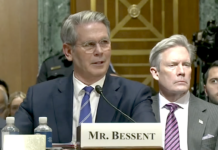
(GA Recorder) — The latest plan to expand school vouchers in Georgia was dealt a blow Thursday when the House failed to hold a vote after more than an hour and a half of debate.
A Republican lawmaker said Senate Bill 233 was tabled because it did not have the votes to pass. GOP leadership could revive the bill if they believe they have enough support to pass it, but Wednesday is the final day of the 2023 Legislative session.
Cumming Republican Greg Dolezal’s proposed law would dedicate $6,500 to the family of any Georgia public school family that decided to withdraw their child from a low-performing school and educate them at home or a private school.
Voucher bills have been popular in GOP-led states, but Georgia lawmakers have struggled to grow the state’s limited program in recent years.
Advocates say they allow state funds to follow the child rather than the school district, letting parents tailor their children’s education to their specific needs.
“Instead of a top-down, one-size-fits-all system, we can move together in a grassroots approach that is inclusive and respects the dignity and unique gifts of every single child,” said Peachtree Corners Republican Rep. Scott Hilton. “Some students need specialized attention, a different teaching method, a specific curriculum. By giving families more options, we are not only improving educational opportunities, but we’re giving every child an equal opportunity to succeed.”
Some Democrats disagreed with that last part.
Atlanta Democratic Rep. Phil Olaleye said the bill would not be much help to children in rural Georgia, where there are fewer private schools or to children from families who cannot afford the difference between the scholarship amount and tuition.
“Who really stands to benefit from this voucher program? The winners are the privileged few families who have the means to make up the tuition bill expenses,” he said. “The losers? Hundreds of thousands of families who will be presented with a choice that is virtually out of reach. The biggest loser? Georgia schools that now have the impossible task of serving a concentrated pool of our most vulnerable children, creating even more impossible conditions for improvement and success.”
Powder Springs Democrat David Wilkerson balked at suggestions that the bill would be budget neutral because the $6,500 figure is based on the average state share of funds to educate a student.
The actual state share varies by grade level and other factors, and Wilkerson said he was concerned that passing the law during an economic boom time could put the state on the hook to fund private school educations when school dollars are more scarce.
“The bottom line is, whether you like this bill or not, we need to know the cost because what we’re doing is obligating money to students, making promises to families that we will have to continue going forward forever. And if we don’t know the cost now, how do we make that promise to the families that their kids will have that funding to go to private school?”
While the difference in opinion on the bill fell largely along party lines, some Democrats offered their support for the measure, including Rep. Mesha Mainor of Atlanta.
Mainor said she grew up in an area with an undesirable school system but her mother used a different address to send her to a different school. Comparing education to McDonald’s hamburgers, she said all families should have the same choice.
“If you went to McDonald’s every day and got a burnt hamburger and burnt fries, are you going to keep going back to that McDonald’s?” she asked. “That’s what the children are saying. I don’t want to go where the burnt hamburger is. I don’t want to go where the burnt fries are. I want a fresh hamburger. I want a fresh education. I want something different. Just give me something different.”







